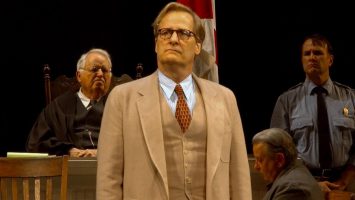
When I first heard that Aaron Sorkin was writing a new version of “To Kill A Mockingbird” for Broadway, I thought, “Oh, no!” A stage rendering of the classic book already existed — we saw it produced at the St. Louis Rep a couple of years ago, and it was fine — and I worried that Sorkin (whose work I mostly admire) would screw it up.
Then it was revealed that Jeff Daniels would play the lead character, Atticus Finch. Daniels is to Sorkin what Joe Mantegna was to David Mamet, an actor who didn’t just perform the writer’s words, but channeled them. That casting gave me more hope for the new production, so while we were in New York over Christmas weekend, I got tickets and went with my wife and daughter.
I’m happy to report that my concerns were for naught. Sorkin’s script manages to make Lee’s story even better and, with Bartlett Sher’s direction and a very good supporting cast, this update of “Mockingbird” is an absolute winner.
The three child characters — Scout, Jem, and Dill — are played by adults (Celia Keenan-Bulger, Will Pullen, and Gideon Glick), and serve as both narrators and participants, although their stories now play a smaller role than the centerpiece court case of Tom Robinson (Gbenga Akinnagbe), the black man accused of rape by Mayella Ewell (Erin Wilhelmi), daughter of Klan member Bob Ewell (Frederick Weller). It is in the courtroom that Sorkin is at his best, as Atticus dissects the prosecution’s case. There’s also an enhanced role for Calpurnia (LaTanya Richardson Jackson), who not only helps raise Scout and Jem while keeping the Finch house in order, but also keeps Atticus on his toes, particularly later in the play. It’s a perspective that was sadly ignored in the earlier “Mockingbird” iterations.
It’s a little bit odd to watch a drama unfold knowing how it will end and yet be moved enough to cry at its conclusion. That’s an indicator of how powerful the core story remains, and how Sorkin has enhanced it. My only complaint was his omission of a line from the movie, spoken by a black reverend. Having watched the proceedings with members of his flock from the balcony of the courtroom, he told Jem and Scout — in a sign of respect as Atticus left the courtroom — to stand up because their father was passing.
The Broadway production doesn’t end with the jury’s verdict, however. There’s further conflict between Bob Ewell and Atticus Finch, and a nice denouement for the younger characters, too.
I saw Jeff Daniels on Broadway a couple of years ago in the intense drama “Blackbird” (read my rave review here). He shared that stage with Michelle Williams, who stayed with him step for step in a brilliant pas de deux. In “Mockingbird,” though there are lots of other characters (yes, including Boo Radley!), it is Daniels-as-Atticus who is the motor that makes the whole engine run smoothly as it changes gears on the way to a satisfactory finish. Whoever replaces him on Broadway, or the inevitable national tour, will have quite a task — to paraphrase Harper Lee — walking around in his skin.
